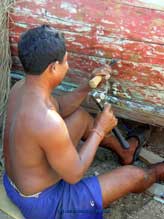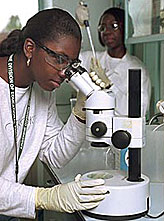UNESCO is 60
© UNESCO/Alberto Jonquières
Week 48: 07/08-13/08 2006Traditional knowledge is much more than just a reflection of mainstream knowledge. It is a cumulative and dynamic body of knowledge possessed by peoples with long histories of interacting with their natural milieu. More © UNESCO / D. Roger
Week 40: 12/06-18/06 2006Desertification affects one quarter of the earth’s surface and over a billion people. UNESCO is working to reverse one of the world’s most alarming processes of environmental degradation. More  © UNESCO/D.Elias
Week 31: 10/04-16/04 2006Representing 20% of UNESCO's Member States, small islands face unique social and economic challenges. More © UNESCO/Dominique Roger
Week 28: 20/03-26/03 2006The World Water Forum (taking place in Mexico from 16-22 March) reminds us of the fragile nature of this resource which is threatened by pollution, population growth and poor management. More ©UNESCO/Dominique Roger
Week 23: 13/02-19/02 2006To better the relationship between people and their environment: this is why UNESCO launched the Man and the Biosphere (MAB) programme in 1971. Three decades later, over 482 biosphere reserves span the globe in hopes of preserving our planet’s biodiversity . More  © J. Foy/UNESCO
Week 16: 19/12-25/12 2005Oceans cover some 70% of the Earth’s surface and transcend national borders. International cooperation is essential for studying them. This is precisely the role of UNESCO's Intergovernmental Oceanographic Commission (IOC). More  © Académie des sciences
Week 9: 31/10-06/11 2005Many countries find themselves excluded from the benefits of science-based technologies. For this reason, UNESCO endeavours to better share scientific knowledge resources. More |



